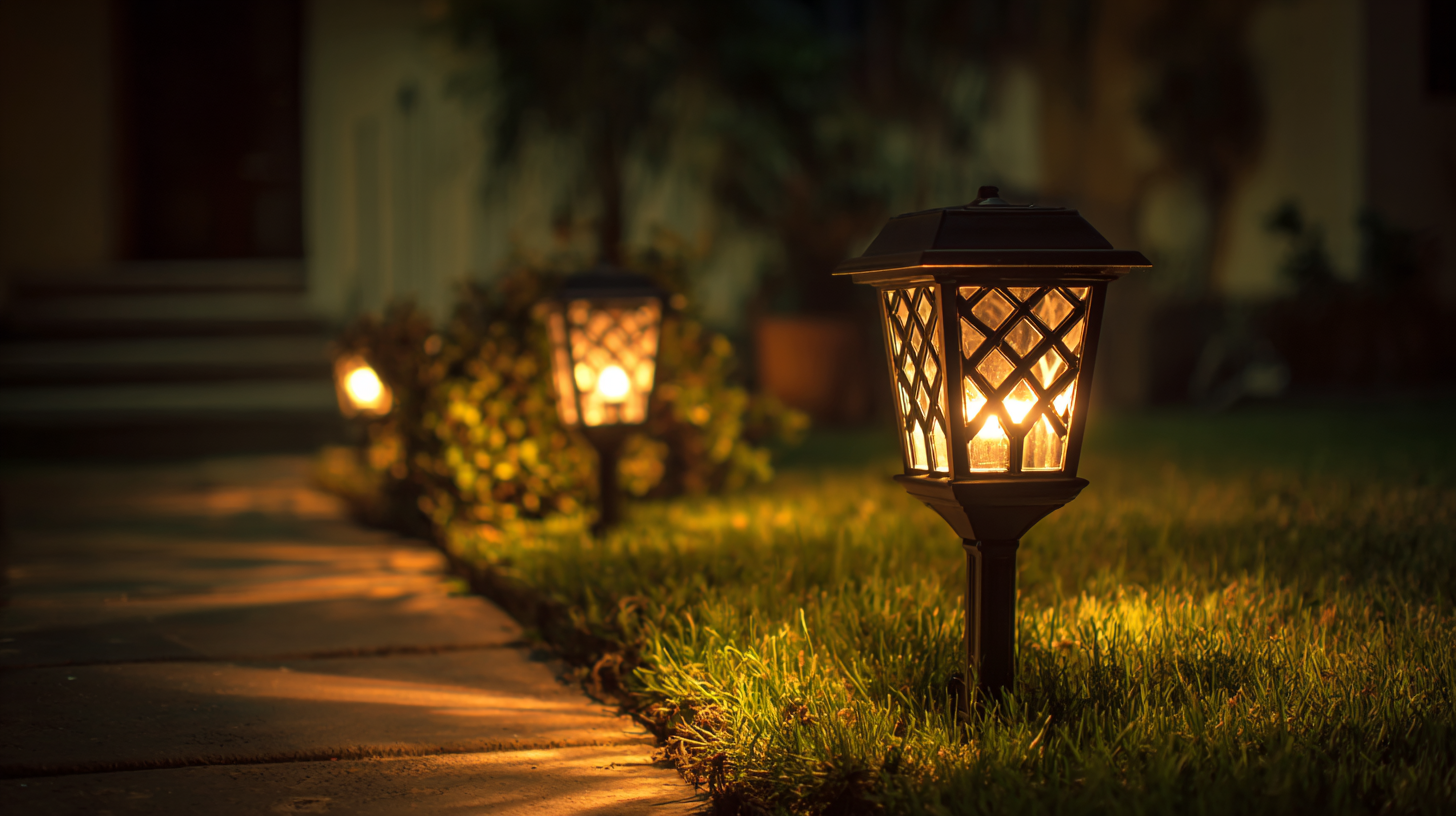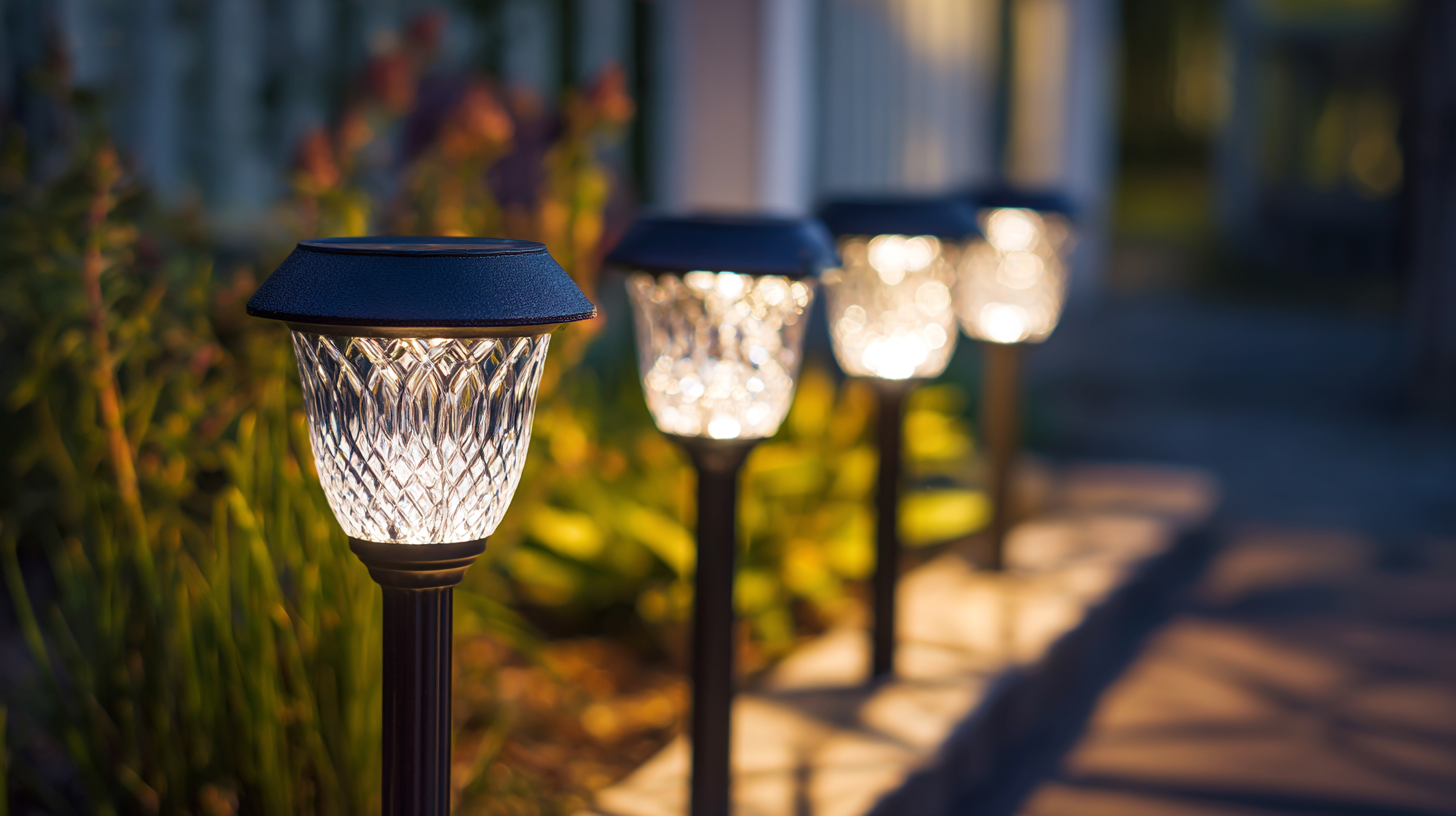15 Essential Tips for Choosing the Best Solar Lights for Your Home
As the demand for renewable energy solutions continues to rise,
solar lights have emerged as a popular choice for homeowners seeking eco-friendly and cost-effective lighting options.
According to a 2023 report by the International Energy Agency, the global solar lighting market is projected to grow by over
25% annually through 2025, driven by advancements in solar technology and a growing emphasis on sustainable living.
With the ongoing push for energy efficiency and reduced carbon footprints, selecting the best solar lights for your home requires careful consideration of various factors,
from luminescence and battery life to design and durability. This blog explores 15 essential tips to help you make informed decisions
in choosing solar lights that not only illuminate your space but also contribute to a greener future.
Understanding Your Lighting Needs for Solar Lights
When selecting solar lights for your home, understanding your specific lighting needs is crucial. Consider the areas you intend to illuminate—whether it's your garden, pathway, or patio. Each space may require different types of solar lights; for example, pathway lights should be bright enough to guide guests safely, while ambient lights for your patio can be softer to create a cozy atmosphere.
 Assess the size of the area and the intensity of light needed, as larger spaces might benefit from a combination of different solar light types to ensure even distribution and adequate brightness.
Assess the size of the area and the intensity of light needed, as larger spaces might benefit from a combination of different solar light types to ensure even distribution and adequate brightness.
Additionally, take into account the duration and timing of light usage. If you want lights that operate during the night, look for solar lights with high-capacity batteries and efficient solar panels, so they can harness enough energy during the day to last through the night. Moreover, consider features like motion sensors or dimming capabilities, which can enhance the functionality of your solar lights while optimizing energy usage. Being clear about your lighting needs upfront will significantly help in choosing the best solar lights that align with your lifestyle and preferences.
Evaluating Solar Panel Efficiency for Optimal Performance
When selecting solar lights for your home, evaluating solar panel efficiency is crucial for ensuring optimal performance. The efficiency of a solar panel indicates how effectively it converts sunlight into usable electricity.
Higher efficiency panels produce more power from the same amount of sunlight, making them an excellent choice for areas with limited sunlight. Look for panels with an efficiency rating of 15% or higher, as they typically offer better performance in different weather conditions and throughout varying seasons.
It's also essential to consider the type of solar cells used in the solar lights. Monocrystalline panels, known for their high efficiency and longevity, are often the best option for residential use. They perform better in low-light conditions compared to their polycrystalline counterparts.
Additionally, checking the wattage of the solar lights can help gauge their brightness and overall energy output. A combination of high-efficiency solar panels and adequate wattage will ensure your solar lights provide consistent lighting when needed, enhancing both security and aesthetics around your home.
Choosing the Right Style and Design for Your Outdoor Spaces
When selecting solar lights for your outdoor spaces, style and design should be at the forefront of your decision-making process. Consider the overall aesthetic of your home and garden. For a modern look, opt for sleek, minimalist solar lights that complement your contemporary architectural features. In contrast, traditional lantern-style solar lights can add a charming touch to rustic or classic homes. The right design will not only enhance the visual appeal of your space but also create a cohesive look throughout your garden.

Another essential tip is to think about the functionality of the solar lights. For areas where you entertain guests, choose brighter, more decorative lighting options to create a warm atmosphere. If you're illuminating pathways, low-profile solar lights can provide safety and visibility without obstructing the view of your landscaping. Additionally, consider adjustable solar lights that can be repositioned or altered to suit changing needs, ensuring that your outdoor spaces remain vibrant and practical throughout the year.
Assessing Battery Life and Storage Capacity in Solar Lights
When selecting solar lights for your home, assessing battery life and storage capacity is crucial. The efficiency of solar lights greatly depends on their ability to store energy from the sun, which directly affects how long they can illuminate your space after sunset. Most solar lights use rechargeable batteries, commonly nickel-metal hydride (NiMH) or lithium-ion, each with its own strengths. Understanding the differences in battery types can help you choose lights that will perform reliably in varying weather conditions.
Another important factor to consider is the capacity of the battery, typically measured in milliamp-hours (mAh). A higher mAh rating indicates a greater storage capacity, enabling the lights to run longer during the night. It's also essential to evaluate how quickly the lights can recharge during the day; some models incorporate larger panels for faster charging. By selecting solar lights with optimized battery life and storage capacity, you can ensure that your outdoor spaces are effectively illuminated while minimizing the hassle of frequent replacements or underperformance. This thoughtful approach can significantly enhance your outdoor experience and maintain a welcoming atmosphere throughout the night.
15 Essential Tips for Choosing the Best Solar Lights for Your Home - Assessing Battery Life and Storage Capacity in Solar Lights
| Feature |
Description |
Recommendation |
| Battery Type |
Lithium-ion or NiMH are common for efficiency and longevity. |
Choose lithium-ion for better performance in colder climates. |
| Battery Capacity |
Measured in milliampere-hours (mAh), it indicates how much energy the battery can store. |
Look for at least 2000 mAh for all-night illumination. |
| Charging Time |
The time needed for the battery to fully charge from solar energy. |
Aim for models that fully charge in 6 to 8 hours. |
| Runtime |
Duration the light stays on after sunset based on a full charge. |
Choose lights with at least 8 hours of runtime for nighttime use. |
| Solar Panel Efficiency |
How effectively the panel converts sunlight into electricity. |
Opt for panels with at least 15% efficiency for better performance. |
| Weather Resistance |
Ability to withstand various weather conditions. |
Look for IP65 rating or higher for good weatherproofing. |
| Light Output |
Measured in lumens, indicates brightness of the light. |
Select at least 100 lumens for effective outdoor lighting. |
| Adjustable Settings |
Features for controlling brightness or operational modes. |
Choose lights with adjustable settings for versatility. |
| Installation |
Ease of setup and mounting options available. |
Select models that offer straightforward installation without professional help. |
| Maintenance Requirements |
Level of upkeep needed to keep solar lights functional. |
Opt for low-maintenance options with minimal cleaning needs. |
Analyzing Budget and Long-Term Savings with Solar Lighting Solutions
When considering solar lights for your home, it's essential to analyze both budget constraints and potential long-term savings. According to a report by the Solar Energy Industries Association (SEIA), the average cost of solar energy systems has dropped by about 70% over the last decade, making solar lighting solutions more accessible than ever. By investing in solar lights, homeowners not only reduce their initial expenditure on electricity but also minimize long-term energy costs. On average, families can save approximately $300 per year on energy bills by transitioning to solar lighting.
Furthermore, the durability and low maintenance required for solar lighting contribute significantly to long-term savings. A study published in the Journal of Solar Energy Engineering highlights that high-quality solar lights can last up to 20 years, significantly outpacing traditional lighting options that may need frequent replacements. Hence, while the upfront costs for solar lights might be higher than conventional alternatives, the total lifetime savings—factoring in energy savings and reduced replacement frequency—often make them a more economical choice. Homeowners should weigh these considerations carefully to fully appreciate the financial benefits of solar lighting.


 Assess the size of the area and the intensity of light needed, as larger spaces might benefit from a combination of different solar light types to ensure even distribution and adequate brightness.
Assess the size of the area and the intensity of light needed, as larger spaces might benefit from a combination of different solar light types to ensure even distribution and adequate brightness.